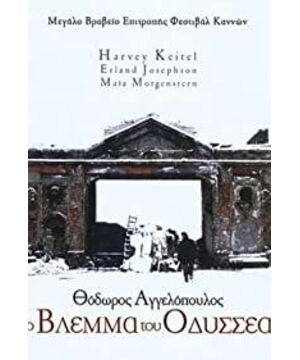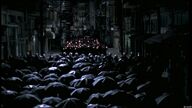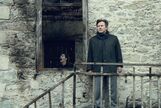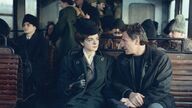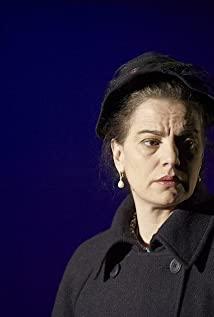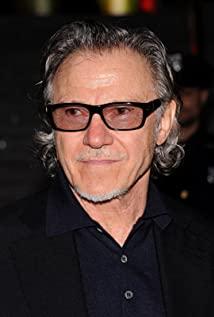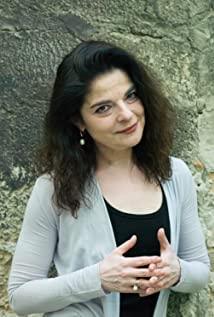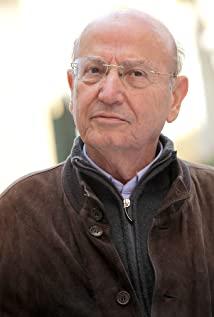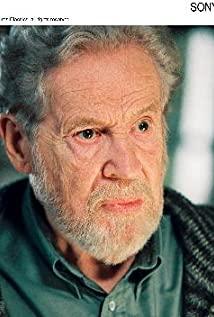"Is this the first gaze?"
The 100th anniversary of the birth of the 1995 film, the recollection of the "first gaze" is An Zhe's reflection on the origin of the relationship between film and history in the past century.
An Zhe believes that after a century of development, the film has lost its original quality and its "first glance" innocence. Are we innocent enough to face and recognize a miracle full of emotions, just like the first time humans face a camera lens?
Journey and theme
The homecoming journey contains at least three meanings: space; time; private.
The history of the Balkans in the 20th century, the evolution of film from its invention to the present, the portrait of the director in crisis, and his desire for ideal love. At the same time, the significance of this journey is political. It directly touched on the chaotic status quo of Bosnia (central and western Yugoslavia), modern slaughterhouses filled with gunpowder and living killings.
The internal structure of two-way polyphony: A's journey not only points to the future, but also constantly falls into the past.
Single stroboscopic flashback
Thessaloniki Gulf
The 40-year period is condensed specifically in an undifferentiated time and place
The assistant's walk on the harbour indicates the passing of time
The camera and the narrator (A) share the same perspective and the same subjectivity. This determines that A's journey is not only a linear development of the road of search with Sarajevo as the end, but also he replaced Yanaki (A replaced Yanaki's sight on the boat), in the later development of the plot A indeed entered the situation of Yanaki once, transfigured into a historical moment. What A is looking for is not only the vitality and innocence of the movie as a new form, but also the excitement of the Manaki brothers when they got the camera, and their subject matter.
Railway midway station
A shared Yanaki’s encounter, entered the moment when his bad luck struck, and reproduced his memories by replacing Yanaki, directly experiencing the blood and horror of the "First World War", the turmoil in the Balkans and the displacement of people. And the tragic situation of being a film director. This is not an illusion, nor a transition of the plot, but a reproduction after breaking the boundary between reality and imagination.
Interrupted Waltz
This long scene shows a dramatic stage effect. It is A's recollection of the joys and sorrows of his family in his childhood. The family changes from 1945 to 1950 are condensed in just a few minutes, but they reflect the historical destiny of Romania after the Second World War. In the days of panic, people live strong in misfortune, and they have not lost their persistence in hope and thirst for a better life. What has to be amazing is that more than 20 minutes of scenes were actually completed with only one long shot.
For me, my style is trying to absorb and gather space and time, so that space becomes a place through which time passes. …(In this scene) is not real time: five years—the five years that a family has experienced, the five years of Stalinist rule in Romania and Europe—only in a short waltz.
Spiritual Autobiography
The film expresses not only his ideals, but also his doubts about the fate of the Balkans, his attention to the conditions of the Balkans, and the exploration of the impact of the film on the human condition, and so on.
Difficulties as a director
Opponents held candlelights in the procession, and eventually confronted and clashed with supporters on the streets. This scene is very shocking. One party is densely holding an umbrella, while the other is holding a torch. This tense confrontation shows the power of the film image itself, and also reflects the difficult situation of a film director and the crisis of the film. At the same time, it also asked the film's value as an artistic and social record in various contradictions. How should a film director use his own creative methods to express concepts and ideas, and to pursue meaning and freedom? In reality, the director will face many obstacles and setbacks due to the separation of people, the confrontation of ideas, the contradiction between the nation and the country, etc. In order to ensure that his will and ideals are not worn away, he must fight hard and stick to his beliefs. .
"We Greeks are a dying nation": The pride of the new generation of Greeks is losing.
Lenin statue
This sense of persecution seems to forcibly control the viewer's breathing. As the characters of the bystanders and the spectators, we experience the deterrence of the statue itself.
The peasants on both sides of the river gathered, or stood and watched the barge, or chased after the statue, like a sad funeral. The barge drifted away, floating on the water, and history was passing away. This time, A became a witness to the funeral. He witnessed the fate of communism in the Balkans.
"The broken statue represents the end. The complete end."
Border and home
Home is not only a geographical concept, but also a spiritual and cultural destination. When a person is far away from the latitude and longitude of his home and cannot return, it is a geographical wandering; and when a person is in this country, but feels that the spiritual culture and historical traditions of this nation are slowly fading, he feels the same about the surroundings. Strange, spiritual wandering also lies here.
The correspondence between the four women and the Odyssey characters
The appearance of these four women rekindled A's desire for love and catalyzed the rebirth of love. The women helped him to reach the destination, to the place of rebirth.
Although there is no joy in the ending, it gives us a channel to vent and release, to pity and fear.
Director A's journey is a tracing of history and reality, as well as a process of tracing the value of the film itself. He has personally experienced the suffering of the nation-state, and he is the rebirth of ancient sages. A's quest is also a journey of self-discovery. He has found the initial gaze, and he has been reborn in the name of film.
As an artist with a sense of national care and mission cultivated from the land of ancient Greek civilization, Angelopoulos inherited two important aspects of Greek culture: one is Homeric’s world vision and narrative style; the other is ancient The philosophical spirit of Greece-questioning and thinking.
View more about Ulysses' Gaze reviews


